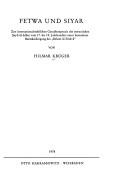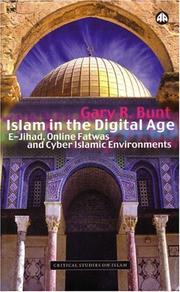| Listing 1 - 10 of 14 | << page >> |
Sort by
|
Book
ISBN: 1463242328 9781463242312 Year: 2021 Publisher: Piscataway, NJ : Gorgias Press
Abstract | Keywords | Export | Availability | Bookmark
 Loading...
Loading...Choose an application
- Reference Manager
- EndNote
- RefWorks (Direct export to RefWorks)
This book presents the positions held by ḥanafite Muslim jurists in South Asia in the 17th century with regard to the coexistence of Muslims and non-Muslims, and, secondly, compares the opinions put forth by these South Asian jurists with those maintained by their counterparts in Central Asia and the Middle East.
Dhimmis (Islamic law) --- Fatwas --- Hanafites --- Islam --- Islamic law --- Religious pluralism --- History --- Relations --- Hinduism --- Fatāwá al-ʻĀlamgīrīyah.
Book
ISBN: 1283625741 1461646855 9786613938190 9781461646853 0742551210 9780742551213 Year: 2008 Publisher: Lanham Rowman & Littlefield
Abstract | Keywords | Export | Availability | Bookmark
 Loading...
Loading...Choose an application
- Reference Manager
- EndNote
- RefWorks (Direct export to RefWorks)
Warrant for Terror examines fatwas, which are legal opinions declaring whether a given act under Islam is obligatory, permitted, or forbidden and which serve as a major instrument by which religious leaders impel believers to engage in acts of jihad.
Terrorism --- Jihad. --- Fatwas. --- Fatāwá --- Fatwas --- Advisory opinions (Islamic law) --- Islamic law --- Holy war (Islam) --- Islamic holy war --- Jahad --- Jehad --- Muslim holy war --- War (Islamic law) --- Islam and terrorism --- Religious aspects --- Islam. --- Law and legislation --- Sources
Book
ISBN: 9048531624 9789048531622 9789462981850 946298185X Year: 2017 Publisher: Amsterdam
Abstract | Keywords | Export | Availability | Bookmark
 Loading...
Loading...Choose an application
- Reference Manager
- EndNote
- RefWorks (Direct export to RefWorks)
This book looks at fatwa in Indonesia during the period following the fall of President Suharto. It is an in-depth exploration of three fatwa-making agencies-Majelis Ulama Indonesia, Lajnah Bahth al-Masail Nahdlatul Ulama, and Majelis Tarjih Muhammadiyah-all of which are highly influential in shaping religious thought and the lives of Muslims in Indonesia. Rather than look at all the fatwa that have emerged in the period, Pradana Boy ZTF focuses on those that have strong repercussions for intra-community relations and the development of Indonesian Muslims more generally, including fatwa pertaining to sectarianism, pluralism, secularism and liberalism.
Fatwas --- Ulama --- Ulema --- Islam --- Muslim scholars --- Fatāwá --- Advisory opinions (Islamic law) --- Islamic law --- Functionaries --- Law and legislation --- Sources --- Fatwa, Islamic Legal Thought, Majelis Ulama Indonesia, Majelis Tarjih, Bahth al-Masail, Islamic Law.
Book
ISBN: 100926088X 1009260928 9781009260909 1009260898 Year: 2023 Publisher: Cambridge : Cambridge University Press,
Abstract | Keywords | Export | Availability | Bookmark
 Loading...
Loading...Choose an application
- Reference Manager
- EndNote
- RefWorks (Direct export to RefWorks)
In this book, Omer Awass examines the formation, history, and transformation of the Islamic legal discourse and institutions through the lens of a particular legal practice: the issuance of fatwas (legal opinions). Tracing the growth of Islamic law over a vast geographical expanse -from Andalusia to India - and a long temporal span - from the 7th to the 21st century, he conceptualizes fatwas as the 'atomic units' of Islamic law. Awass argues that they have been a crucial element in the establishment of an Islamic legal tradition. He also provides numerous case studies that touch on economic, social, political, and religious topics. Written in an accessible style, this volume is the first to offer a comprehensive investigation of fatwas within such a broad spatio-temporal scope. It demonstrates how instrumental fatwas have been to the formation of Islamic legal traditions and institutions, as well as their unique forms of reasoning.
Fatwas --- Islamic law --- History. --- Interpretation and construction --- Civil law (Islamic law) --- Law, Arab --- Law, Islamic --- Law in the Qurʼan --- Sharia (Islamic law) --- Shariʻah (Islamic law) --- Law, Oriental --- Law, Semitic --- Fatāwá --- Advisory opinions (Islamic law) --- Law and legislation --- Sources
Book
ISBN: 0520095138 9780520095137 Year: 1975 Volume: 19 Publisher: Berkeley (Calif.) : University of California,
Abstract | Keywords | Export | Availability | Bookmark
 Loading...
Loading...Choose an application
- Reference Manager
- EndNote
- RefWorks (Direct export to RefWorks)
Church buildings --- Fatwas --- Christians --- Legal status, laws, etc --- -Christians --- -Fatwas --- Fatāwá --- Advisory opinions (Islamic law) --- Islamic law --- Religious adherents --- Churches --- Buildings --- Church facilities --- Church architecture --- Law and legislation --- Sources --- Fatwas. --- Legal status, laws, etc. --- Church buildings - Egypt - Cairo --- Christians - Egypt - Legal status, laws, etc

ISBN: 344701783X Year: 1978 Publisher: Wiesbaden Harrassowitz
Abstract | Keywords | Export | Availability | Bookmark
 Loading...
Loading...Choose an application
- Reference Manager
- EndNote
- RefWorks (Direct export to RefWorks)
Dhimmis --- Fatwas --- International law (Islamic law) --- Status (Islamic law) --- Islamic law --- Islamic international law --- Fatāwá --- Advisory opinions (Islamic law) --- Non-Muslims (Islamic law) --- Law and legislation --- Sources --- Fatwas. --- Dhimmis (Islamic law) --- Dhimmis (Islamic law). --- Status (Islamic law). --- International law (Islamic law).

ISBN: 1849641943 0585488606 9781849641944 9780585488608 0745320996 9780745320991 0745320988 9780745320984 Year: 2003 Publisher: London Sterling, Va. Pluto Press
Abstract | Keywords | Export | Availability | Bookmark
 Loading...
Loading...Choose an application
- Reference Manager
- EndNote
- RefWorks (Direct export to RefWorks)
How the internet affects global Muslim consciousness.
Islam --- Jihad. --- Fatwas. --- Fatāwá --- Fatwas --- Advisory opinions (Islamic law) --- Islamic law --- Holy war (Islam) --- Islamic holy war --- Jahad --- Jehad --- Muslim holy war --- War (Islamic law) --- Mohammedanism --- Muhammadanism --- Muslimism --- Mussulmanism --- Religions --- Muslims --- Computer network resources. --- Law and legislation --- Sources --- Jihād --- Ressources Internet --- Jihad --- Computer network resources --- Islam - Computer network resources --- Jihad - Computer network resources
Book
ISBN: 9004367853 9789004367852 9789004367791 9004367799 Year: 2018 Publisher: Leiden Boston
Abstract | Keywords | Export | Availability | Bookmark
 Loading...
Loading...Choose an application
- Reference Manager
- EndNote
- RefWorks (Direct export to RefWorks)
In How Muftis Think Lena Larsen explores fatwas that respond to questions asked by Muslim women in Western Europe in recent decades. The questions show women to be torn between two opposing notions of morality and norms: one stressing women’s duties and obedience, and one stressing women’s rights and equality before the law. Focusing on muftis who see “the time and place” as important considerations in fatwa-giving, and seek to develop a local European Islamic jurisprudence on these increasingly controversial issues, Larsen examines how they deal with women’s dilemmas. Careful not to suggest easy answers or happy endings, her discussion still holds out hope that European societies and Muslim minorities can recognize shared moral concerns.
Women (Islamic law) --- Muftis (Muslim officials) --- Fatwas --- Islamic law --- Uṣūl al-fiqh (Islamic law) --- Fatāwá --- Advisory opinions (Islamic law) --- Islam --- Women --- Interpretation and construction. --- Uṣūl al-Fiqh --- Law and legislation --- Sources --- Functionaries --- Legal status, laws, etc. (Islamic law)
Book
ISBN: 0814271251 0814251714 Year: 2014 Publisher: Columbus : The Ohio State University Press,
Abstract | Keywords | Export | Availability | Bookmark
 Loading...
Loading...Choose an application
- Reference Manager
- EndNote
- RefWorks (Direct export to RefWorks)
By examining Arabic legal opinions, Ahmed Fakhri seeks to understand how the organization of these texts accomplishes specific social goals. In doing so, he hopes to illuminate socio-cultural practices among those who produce and use these texts. Like other sociolinguistics projects, this manuscript unites texts with their social contexts. Fakhri also points out that legal texts have traditionally held an important place in Arabic culture and therefore provide an especially illuminating window into the broader realm of Arabic thought and culture.
Sociolinguistics. --- Islamic law --- Fatwas. --- Arabic language --- Language. --- Discourse analysis. --- Semitic languages --- Fatāwá --- Fatwas --- Advisory opinions (Islamic law) --- Civil law (Islamic law) --- Law, Arab --- Law, Islamic --- Law in the Qurʼan --- Sharia (Islamic law) --- Shariʻah (Islamic law) --- Law, Oriental --- Law, Semitic --- Language and languages --- Language and society --- Society and language --- Sociology of language --- Language and culture --- Linguistics --- Sociology --- Integrational linguistics (Oxford school) --- Law and legislation --- Sources --- Social aspects --- Sociological aspects

ISBN: 0674468708 9780674468702 Year: 1996 Volume: *1 Publisher: Cambridge, Mass. ; London Harvard University Press
Abstract | Keywords | Export | Availability | Bookmark
 Loading...
Loading...Choose an application
- Reference Manager
- EndNote
- RefWorks (Direct export to RefWorks)
Fatwas. --- Muftis (Muslim officials) --- Islamic law --- Fatwas --- Muftis --- Droit islamique --- Interpretation and construction. --- Interprétation --- 297.15 --- Islam --- Fatāwá --- Advisory opinions (Islamic law) --- Civil law (Islamic law) --- Law, Arab --- Law, Islamic --- Law in the Qurʼan --- Sharia (Islamic law) --- Shariʻah (Islamic law) --- Law, Oriental --- Law, Semitic --- Islam: ethiek; religieuze wetten --- Functionaries --- Law and legislation --- Sources --- Muftis (Muslim officials). --- 297.15 Islam: ethiek; religieuze wetten --- Uṣūl al-fiqh (Islamic law) --- Uṣūl al-Fiqh --- Interprétation --- Interpretation and construction --- History --- Fatwåas - History. --- Islamic law - Interpretation and construction
| Listing 1 - 10 of 14 | << page >> |
Sort by
|

 Search
Search Feedback
Feedback About UniCat
About UniCat  Help
Help News
News